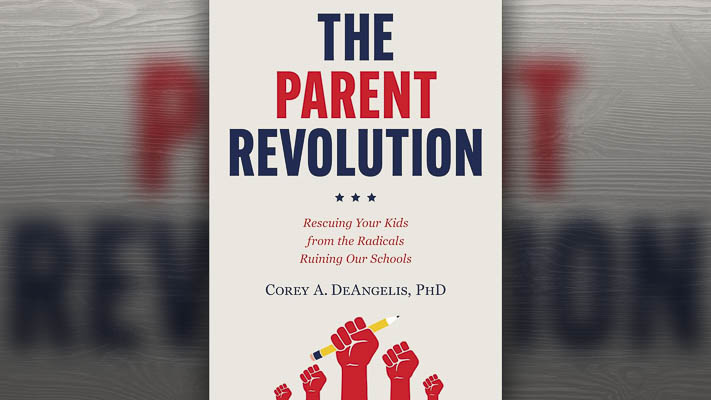
Liv Finne of the Washington Policy Center shares her thoughts on a new book by Dr. Corey DeAngelis
Liv Finne
Washington Policy Center
“The Parent Revolution,” a new book by Dr. Corey DeAngelis, is an education reform thriller.
Corey DeAngelis does a masterful job of describing the dramatic ups and downs, ins and outs, of the passing of school choice bills across the nation.

He accurately describes the education choice tidal wave that has swept the nation since the end of extended COVID school shutdowns in 2020-21. These school choice victories now offer families between $4,600 and $8,000 per child to customize education to fit the needs of children. Legislators in forward-looking states are now allowing parents to hire tutors, buy books and online curricula, tap learning specialists, and pay private school tuition, all tailored to each child’s circumstances. Twenty million students, thirty-six percent of American school children, now live in states with access to public aid to attend a private school through enlightened school choice laws.
I know better than anyone that reading about public policy can be dry as dust. But Dr. DeAngelis writes an exciting story. One chapter, titled “West Virginia goes from 0 to 100,” provides a stirring account of how lawmakers in a union-dominated state overcame reactionary forces to push reform forward. In 2019 state senator Patricia Puertas Rucker, Chair of the Senate Education committee, convinced the state senate to pass her bill to offer 1,000 needy families in an Education Savings Account (ESA) with up to $4,600 per child to pay for private education.
Alarmed, the union brought out the big guns to kill the bill. The American Federation of Teachers, led by Randi Weingarten, and the state’s two other teachers unions closed all the schools in West Virginia with an illegal strike. Their demands included killing the choice bill for families plus a pay raise for themselves. Initially cowed, Republican legislators in the House of Delegates set the ESA bill aside and then voted out the pay raise demanded by the union.
The day after this retreat, Senator Rucker went on statewide radio and promised her constituents that if re-elected in 2020 she would pass a much more ambitious ESA policy. But that would require a different legislature. The union specifically targeted $250,000 to knock Senator Rucker out of office. They failed. Senator Rucker won re-election and voters expanded the Republican majority, adding three GOP seats in the Senate and 17 seats in the House of Delegates, giving Republicans a supermajority.
In 2021 Senator Rucker re-introduced her bill, but this time expanding tax-funded learning options to every family in the state. Then, in the words of Corey DeAngelis, the “union and their political and media allies freaked out.” They claimed passing Rucker’s bill was an attempt to destroy public education. As he puts it:
“Media outlets did their best to turn union talking points into the official narrative. For example, Susan Johnson of the West Virginia Gazette warned readers about the supposed ‘weakening of the public schools’ and predicted ‘cuts in teacher position, salaries and benefits.’”
Despite this dishonest opposition, in March of 2021 West Virginia’s legislature passed, and Governor Jim Justice signed the Hope Scholarship Act. This ground-breaking law offers, at the parent’s option, an ESA funded with $4,600 per child to every family, making West Virginia the first state to pass universal school choice in the nation.
The win in West Virginia was just the first such victory. In just three years eleven more states have since passed universal school choice laws. Dr. DeAngelis describes similar inspiring legislative battles in Arizona, Iowa, Oklahoma, Kentucky, Tennessee, and Florida, along with the political strategies and messaging that fueled these wins. He shows that caring Republican lawmakers who are open to school choice are winning election to office, and that hardliners wedded to the entrenched system tend to lose. He notes that school choice is shifting from edgy to mainstream and that Democrats will likely get on board as well, especially at the state level.
None of these victories would have been possible but for the public’s broad dissatisfaction with government schools. The extended COVID school shutdowns upset many parents. In his book Dr. DeAngelis observes that many public school administrators exploited the death of George Floyd to sneak the racist CRT (Critical Race Theory) ideas into the classroom. CRT ideology falsely tells American students that their country was founded to promote slavery (see for example The New York Times’ discredited 1619 Project), are being accused of harboring “white privilege,” and are presenting children with books based on lies, like “Gender Unicorn.”
Polls show that people are losing trust in American institutions and recent news out of major school districts are certainly disheartening. But with the Parent Revolution Dr. DeAngelis taps the latest policy advances to present a story of triumph and success in the face of a government school monopoly and special interests determined to protect their system.
And a key part of this story is the work of untiring heroes like Corey DeAngelis and Senator Rucker who have succeeded in delivering better education options to millions of children across the country.
One week after its release The Parent Revolution is already a national best-seller. That’s no surprise to me. The book is a joy and inspiration to read.
Liv Finne is the director of the Center for Education at the Washington Policy Center.
Also read:
- Opinion: Courts blocking the Kroger-Albertson merger won’t stop consumers from making choicesPaul Guppy of Washington Policy Center critiques judicial rulings that block the Kroger-Albertsons merger, citing changing consumer trends and potential job losses.
- Opinion: Workers need money — and the many other gifts work can bringElizabeth New Hovde discusses the value of work, its benefits for workers and employers, and its impact on personal growth.
- How Should Washington Taxpayers Handle TriMet’s Proposed Light Rail Costs? Share Your Thoughts!C-TRAN Board reviews TriMet’s proposal for Washington taxpayers to fund 45% of light rail operating costs, sparking local debate.
- Opinion: Get ready for the 2025 legislative sessionNancy Churchill emphasizes the importance of citizen participation as the 2025 Washington legislative session begins.
- Opinion: Thousands of Republicans didn’t vote. Why?Amboy resident Thomas Schenk discusses low Republican voter turnout and election concerns in Clark County.










